
Perhaps you’ve heard of the recent trend among a small sect of ultra-Orthodox women to follow the example of modesty set by Muslim women by wearing burqas that completely disguise the shapes of their bodies. Most Orthodox communities are confounded by this latest stringency, thankfully. Us Modern Orthodox women needn’t fear that this will spread to our neck of the woods. However, it does spark an interesting question on the laws of Jewish modesty.
I grew up wearing only skirts — never pants. Since the age of 5 my parents only allowed me to wear pants when I was horseback riding or skiing. In my elementary and middle schools, I was the only girl whose parents had this rule. I ached to wear pants like my classmates. In school we had a dress code that forbade pants, but whenever I had a play-date, I envied my friends and their luck.
When I reached the age of 12 and my friends and I all had our bat mitzvahs, a lot of the girls in my class started wearing skirts as well. And anyway, by this point I was more comfortable wearing only skirts. Then I switched to a more right-wing school for high school and no one there would dream of wearing pants, so the whole topic became moot. It wasn’t until I reached college that I really thought about tzniut (modesty) in an intellectual way.
Here in Stern College for Women at Yeshiva University, you’ll meet a wonderful array of Modern Orthodoxy, and nothing is more telling than the clothing worn by each student. My friend and I recently tried to categorize them: There are the women who dress strictly in long skirts and shirts that cover the elbow and collarbone, and generally are loose enough that nothing is too revealing; there’s the opposite end of the spectrum, with women who wear skinny jeans and low-cut tank tops (this is technically against the Stern dress code, but it’s rather difficult to enforce such a thing on 1,000 college aged women); and then there are the students in between, whose skirts flirt with crossing the acceptable length line, whose shirts are tight or slightly low cut. The women in this last category are the rebels, who may or may not join the ranks of the Pants, Pants Revolution (girls who grew up wearing skirts but shed that layer of stringency for pants while in Stern).
All things considered, the idea of dressing modestly is one that I find fascinating for many reasons. For one, it’s one of those laws that reflects so much on reality. As Jews, we definitely have the obscure commandments that seemingly have nothing to do with real life, at least as we know it today (What? I’m supposed to blow a ram’s horn? Okay, if you say so…), but a mitzvah based entirely on the tendency of men to find the body of a woman alluring and to have this lead to graphic sexual thoughts… well, that’s one element of human nature that never goes out of style.
The rabbis acknowledged this, and created protective layers, so to speak, that help both the men and women in this situation. Men are less distracted and women are less objectified. There’s a conversation that took place near me once that struck me and I’m often reminded of it when thinking about modesty (or the male mind, which is something I personally love to analyze):
“You have no idea how hard it is to be a woman,” a professional woman complained to her male colleague. “Every five seconds, the guy you’re talking to is staring at your chest.”
“You have no idea how hard it is to be a man,” he returned. “Every five seconds, we can’t help but think about and look at a woman’s chest.” He wasn’t being facetious. He couldn’t fully control his own mind, even when he wanted to. A woman wearing a low-cut shirt would certainly not help the matter. I don’t think women fully realize the effect of how we dress.
Now, I’m not saying women shouldn’t wear sexy clothing because men will then objectify them. Believe me, I love putting on a hot dress and pair of stilettos even more than the next girl. But I also don’t think tzniut is an oppressive, patriarchal ruling meant to repress women. I find it a beautiful concept, if one that’s not always so easy to follow.
Even in my right-wing Orthodox high school, the teachers emphasized the importance of the woman’s right to dress like a woman and feel attractive. Tzniut doesn’t mean we need to hide ourselves. On the contrary, it is a way for a woman to show herself and be seen as more than just a body.
Wearing a burqa completely undermines that idea. The Judaism I know and love doesn’t want women to disappear. It wants us to respect ourselves and our bodies. For some people, that means wearing loose shirts, skirts and tights in every season. For others, that could mean wearing pants. It’s not so much about the precise length of the clothing as it is about the recognition that how we dress is how we’re seen.
